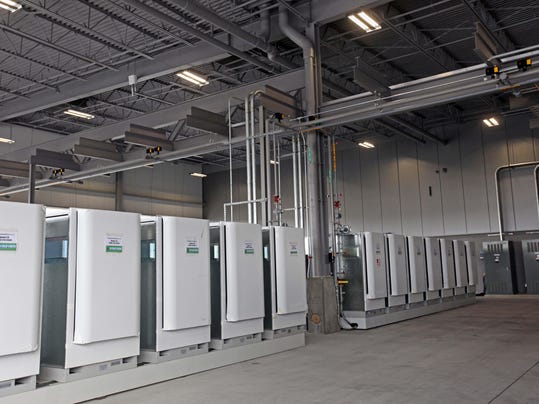Delmarva Power would be required to break out in its bills
how much customers are paying for Bloom Energy and meeting state renewable
energy requirements, according to legislation introduced by a Republican
lawmaker.
The bill would require all electric utilities operating in
Delaware to detail renewable and fuel-cell surcharges, although Delmarva is the
only one with such a fee for Bloom Energy, a solid-oxide fuel cell manufacturer
with a factory in Newark.
The surcharge acts as an economic incentive for
California-based Bloom, which has placed an electrical project at two Delmarva
substations in New Castle County. The project includes some of the first
"Bloom boxes" assembled at the plant.
Bloom says its natural gas-powered fuel-cell servers are
more environmentally friendly than traditional combustion technology because
they do not burn the gas. Purchases from that project mean Delmarva needs to
buy less wind and solar.
A few weeks ago, the Public Service Commission passed an
order that requires Delmarva to place on electric bills the total amount a
customer spent during that month on all obligations related to the Renewable
Portfolio Standard. That includes wind, solar and costs related to the Bloom
Energy fuel cell project.
There is a consensus to break that out next year into the
various forms of renewables and fuel cell charges, but that is not specified in
the PSC order.
The bill, sponsored by David Lawson, R-Marydel, would
require utilities to go that extra step and break out the fuel cell charges.
The only electric utility regulated by the PSC is Delmarva.
The law would also include the Delaware Electric Cooperative and municipal utilities
in the disclosure requirements. Those utilities are required to buy traditional
renewable energy, but not Bloom's fuel cell power.
Sen. Greg Lavelle, R-Sharpley, one of the sponsors of the
bill, said: "Transparency on bills like this is a no-brainer and long
overdue. The Bloom surcharge and other initiatives should be easy for customers
to see and understand what they are paying for beyond electric services.
Governments require all sorts of disclosure on credit cards, pay-day loans and
other private-sector issues, so it should have it here as well. This is
especially true since these are essentially government programs that are being
funded by electric customers."
The bill's sponsors are making it known that if the promises
made to detail the various charges are delayed or dropped, lawmakers will step
in and require it, Lavelle said.
Lawson could not be reached for comment.
The bill, SB226, was assigned to the Democratic-controlled
Senate Energy & Transit Committee. It would need to be acted upon before
the end of the legislative session next month to become law this year.
Lavelle said he anticipates an early June committee hearing,
although he expects to hear arguments that the PSC should be left to try to get
the job done itself. But "they appear late and light on this one," he
said.
Sen. Harris McDowell III, the chairman of the committee, was
in meetings on Wednesday and could not be reached for comment.
Delmarva declined to take a stand on the bill, but its
spokesman, Nick Morici, said: "Delmarva Power supports making electric
bills more transparent and understandable to our customers, and we have and
will continue to work with all stakeholders to do so."
Both the Public Service Commission staff and the Public
Advocate's office declined to take a stance on the bill.


No comments:
Post a Comment